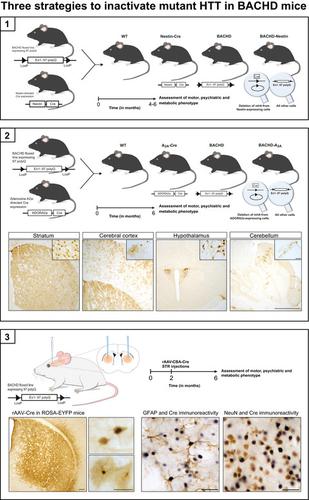当前位置:
X-MOL 学术
›
Neuropathol. Appl. Neurobiol.
›
论文详情
Our official English website, www.x-mol.net, welcomes your feedback! (Note: you will need to create a separate account there.)
Effects of mutant huntingtin inactivation on Huntington disease‐related behaviours in the BACHD mouse model
Neuropathology and Applied Neurobiology ( IF 5 ) Pub Date : 2021-01-12 , DOI: 10.1111/nan.12682 Rachel Y Cheong 1 , Barbara Baldo 1 , Muhammad U Sajjad 1 , Deniz Kirik 2 , Åsa Petersén 1
Neuropathology and Applied Neurobiology ( IF 5 ) Pub Date : 2021-01-12 , DOI: 10.1111/nan.12682 Rachel Y Cheong 1 , Barbara Baldo 1 , Muhammad U Sajjad 1 , Deniz Kirik 2 , Åsa Petersén 1
Affiliation

|
AIMS
Huntington disease (HD) is a fatal neurodegenerative disorder with no disease-modifying treatments approved so far. Ongoing clinical trials are attempting to reduce huntingtin (HTT) expression in the central nervous system (CNS) using different strategies. Yet, the distribution and timing of HTT-lowering therapies required for a beneficial clinical effect is less clear. Here, we investigated whether HD-related behaviours could be prevented by inactivating mutant HTT at different disease stages and to varying degrees in an experimental model. METHODS
We generated mutant BACHD mice with either a widespread or circuit-specific inactivation of mutant HTT by using Cre-recombinase (Cre) under the nestin promoter or the adenosine A2A receptor promoter respectively. We also simulated a clinical gene therapy scenario with allele specific HTT targeting by injections of recombinant adeno-associated viral (rAAV) vectors expressing Cre into the striatum of adult BACHD mice. All mice were assessed using behavioural tests to investigate motor, metabolic, and psychiatric outcome measures at 4-6 months of age. RESULTS
While motor deficits, body weight changes, anxiety and depressive-like behaviours are present in BACHD mice, early widespread CNS-inactivation during development significantly improves rotarod performance, body weight changes and depressive-like behaviour. However, conditional circuit-wide mutant HTT deletion from the indirect striatal pathway during development and focal striatal-specific deletion in adulthood failed to rescue any of the HD-related behaviours. CONCLUSIONS
Our results indicate that widespread targeting and the timing of interventions aimed at reducing mutant HTT are important factors to consider when developing disease-modifying therapies for HD.
中文翻译:

突变亨廷顿蛋白失活对 BACHD 小鼠模型中亨廷顿病相关行为的影响
AIMS 亨廷顿病 (HD) 是一种致命的神经退行性疾病,迄今为止尚未批准任何改善疾病的治疗方法。正在进行的临床试验正试图使用不同的策略来减少中枢神经系统 (CNS) 中的亨廷顿 (HTT) 表达。然而,获得有益临床效果所需的降低 HTT 疗法的分布和时机尚不清楚。在这里,我们研究了是否可以通过在不同疾病阶段和不同程度的实验模型中灭活突变 HTT 来预防 HD 相关行为。方法 我们通过分别在巢蛋白启动子或腺苷 A2A 受体启动子下使用 Cre 重组酶 (Cre) 产生突变 BACHD 小鼠,突变 HTT 广泛或电路特异性失活。我们还通过将表达 Cre 的重组腺相关病毒 (rAAV) 载体注射到成年 BACHD 小鼠的纹状体中来模拟具有等位基因特异性 HTT 靶向的临床基因治疗方案。使用行为测试对所有小鼠进行评估,以研究 4-6 个月大时的运动、代谢和精神结果测量。结果 虽然 BACHD 小鼠存在运动缺陷、体重变化、焦虑和抑郁样行为,但发育过程中早期广泛的 CNS 失活显着改善了转棒性能、体重变化和抑郁样行为。然而,发育过程中间接纹状体通路的条件性全电路突变 HTT 缺失和成年期局灶性纹状体特异性缺失未能挽救任何与 HD 相关的行为。
更新日期:2021-01-12
中文翻译:

突变亨廷顿蛋白失活对 BACHD 小鼠模型中亨廷顿病相关行为的影响
AIMS 亨廷顿病 (HD) 是一种致命的神经退行性疾病,迄今为止尚未批准任何改善疾病的治疗方法。正在进行的临床试验正试图使用不同的策略来减少中枢神经系统 (CNS) 中的亨廷顿 (HTT) 表达。然而,获得有益临床效果所需的降低 HTT 疗法的分布和时机尚不清楚。在这里,我们研究了是否可以通过在不同疾病阶段和不同程度的实验模型中灭活突变 HTT 来预防 HD 相关行为。方法 我们通过分别在巢蛋白启动子或腺苷 A2A 受体启动子下使用 Cre 重组酶 (Cre) 产生突变 BACHD 小鼠,突变 HTT 广泛或电路特异性失活。我们还通过将表达 Cre 的重组腺相关病毒 (rAAV) 载体注射到成年 BACHD 小鼠的纹状体中来模拟具有等位基因特异性 HTT 靶向的临床基因治疗方案。使用行为测试对所有小鼠进行评估,以研究 4-6 个月大时的运动、代谢和精神结果测量。结果 虽然 BACHD 小鼠存在运动缺陷、体重变化、焦虑和抑郁样行为,但发育过程中早期广泛的 CNS 失活显着改善了转棒性能、体重变化和抑郁样行为。然而,发育过程中间接纹状体通路的条件性全电路突变 HTT 缺失和成年期局灶性纹状体特异性缺失未能挽救任何与 HD 相关的行为。



























 京公网安备 11010802027423号
京公网安备 11010802027423号